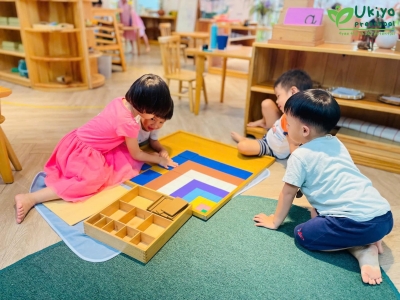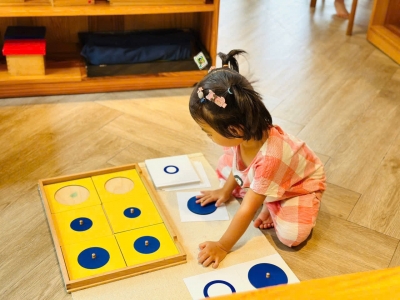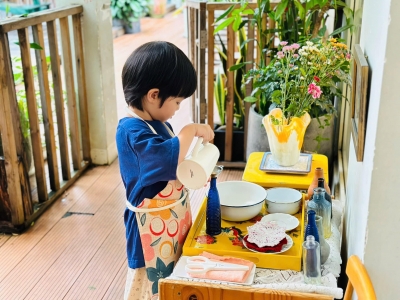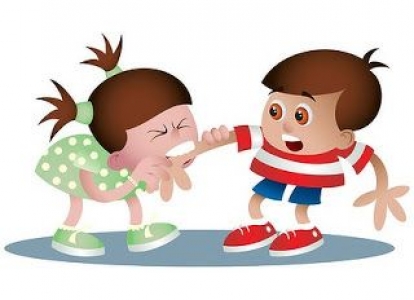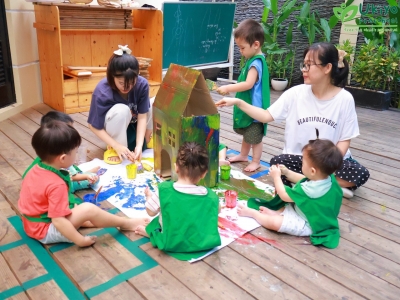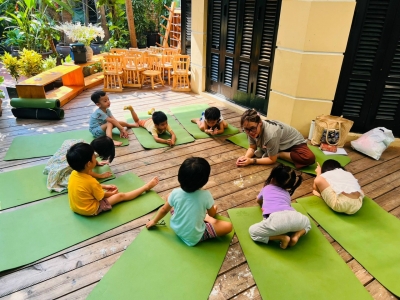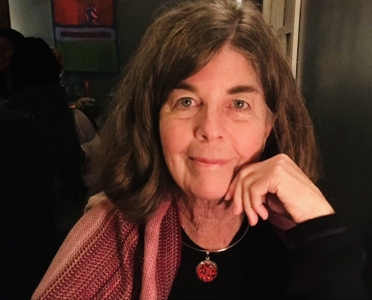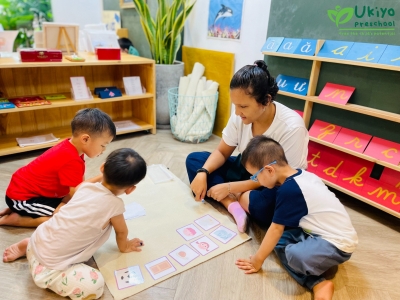LANGUAGE ARTS CORNER AT UKIYO
The sensitive period for language lasts throughout the first 6 years of life. Right from birth, babies have turned their eyes and turned their heads to look for the voices of their mothers, fathers, and people around them, especially those who often talk to them during the foetal period.
There will be an oral language boom until about the age of two. Parents will discover that one day, your quiet child suddenly talks a lot, tells stories, sings songs that you can't remember ever letting them hear or teach them.
According to Ms. Maria Montessori, preschool children between the ages of 0 and 6 have the ability to absorb everything they come into contact with in their lives, including not only language but also actions and culture.This is a unique feature that only preschoolers have. Their vocabulary is much richer than what they say.
Therefore, when they come to school, teachers will do 3 things to develop their spoken language:
1. Develop their vocabulary through learning materials on a variety of topics, teaching specialised words such as kidney-shaped leaves, diamond-shaped leaves, etc.
2. Refine your vocabulary, for example categorize it: cow is farm animal, dog is pet,...
3. Improve their language skills through stories, songs, poems, conversations, role-play lessons… and encourage them to share it with others to develop storytellers.
And most importantly, teachers, or adults are a model, a living tool for them when we communicate with them every day or with other adults around.
Around the age of 4, they begin to take an interest in writing and reading. According to Montessori, we will guide them to write before reading.
What is writing? Writing is expressing thoughts. So, first they have to have the thought, then they have to have the means to express it. When they speak, they only have sounds, so the teachers have to introduce them to letters so they can connect sounds and letters together. And when children have many sounds and many letters, they combine them together and quickly read the words. They will say words, for example /b/-/a/-ba. Reading will come right after writing, because after writing, the first thing children will do is re-read what they wrote. Gradually, your child will read words, read his own sentences, and move on to their friend reading and it is important that he will understand what their friend want to convey through their sentences or paragraph.
Speaking is instinctive, while writing and reading are the work of the mind and hands. Children learn vocabulary without any effort, through the environment, through adults, the absorbent mind, and the sensitive period we mentioned above. While writing is a human invention, only humans have it, and therefore children must work hard to learn it.
Because learning to write is the work of the mind and the hands, Ukiyo teachers must help children prepare for it through a series of activities so they can write and read successfully.
First thing to practise is the mind, they must have a rich vocabulary through spoken language, and they must love the use of language. Love stems from interest, and interest often comes from questions. People of this age often ask, "What is this?" They can ask many times for the same item. Teachers must always answer them with enthusiasm as the first answer, must always encourage them to ask, and must satisfy their needs.
Then there's the hands: in order to write, they have to be able to hold the pen. In Montessori, there are many activities to support children in the pen-holding posture, or pincer grip, such as holding chopsticks, small knobs, etc.
In addition, when writing, they must concentrate on hand-eye coordination, writing direction, line spacing, and so on. All of this is prepared indirectly through exercises in practical life and the senses.
At Ukiyo, the teacher teaches the child to write in cursive handwriting, not print handwriting. Because science proves that cursive handwriting helps brain development. When writing in cursive handwriting, they must write seamlessly. The brain must guide the hands to work, must follow that continuous movement. This supports the child's brain and movement. Furthermore, cursive handwriting is like drawing, and kids love to draw, so they'll be ready to "draw" the word with pleasure.
The oral language stage precedes and lasts longer than the written and read language stages. Because this is the most important foundation and also the most appropriate language approach for preschoolers, that will also be how Ukiyo introduces new foreign languages to children.
Others



